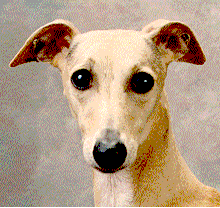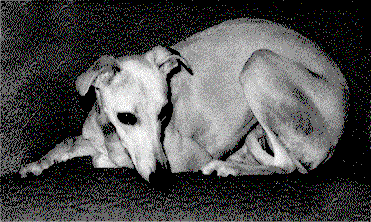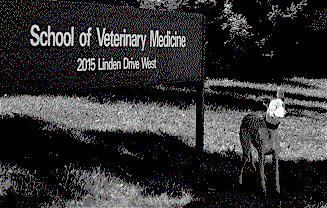

By Peg Haese, Clulan Whippets, Shullsburg, WI
My five-year-old whippet Babs is totally blind now. She is still a happy, mellow individual and has had little trouble adjusting to her handicap. Physically she went through a great deal of pain but mentally she has accepted her changed circumstances with no complaints. To encourage other owners with similar problems, here is our story.
Babs was born in my kitchen. Her dam Jackie was very well known as a racer, lure-courser, and obedience and tracking titlist. Sire Dusky easily earned his ARM and completed his CD with a national ranking. I hoped that some of the puppies would be racing stars like their parents and cousins, but to my disappointment their talents were concentrated in other directions. Brother Orson Welles was Best in Field at his first lure-coursing meet and won his field championship in five meets. Sister Sox was High in Trial at the first American Whippet Club national specialty, finishing her CD two weeks later with good scores. Another sister, Dino, was given to a friend of a friend and enjoys life as the only dog in a loving family. The other two bitches, Amy and Tootsie, are very fast but won't run in competition.
 Babs herself showed good promise as an obedience dog.
She also picked up a 40-point first place and the rest of the
points towards her field championship, but couldn't get the other
placements needed to finish. She seemed to be healthy but short
on endurance. My vets checked her out and put her on thyroid
supplement. Her eyes had been checked by a specialist at a
screening clinic when she was 18 months old and I never got
around to having her done again since she wasn't being bred or
shown. Whippets don't have serious eye problems, right? Wrong! Of
course that's what her health problem was.
Babs herself showed good promise as an obedience dog.
She also picked up a 40-point first place and the rest of the
points towards her field championship, but couldn't get the other
placements needed to finish. She seemed to be healthy but short
on endurance. My vets checked her out and put her on thyroid
supplement. Her eyes had been checked by a specialist at a
screening clinic when she was 18 months old and I never got
around to having her done again since she wasn't being bred or
shown. Whippets don't have serious eye problems, right? Wrong! Of
course that's what her health problem was.
I noticed Babs squinting her left eye one afternoon and thought maybe she had bumped it. Since it appeared to be okay a short while later it didn't seem important enough to have my vet look at her. But a week later when she was squinting the other eye, it was obviously time to get it checked out. Babs was treated for a corneal abrasion of the right eye. My vet politely thought I was mistaken when I told him the left eye had bothered her earlier. When it developed a blue area he started treating it for a corneal ulcer. Both eyes quickly became worse and I was asked if I wanted to be referred to the University of Wisconsin-Madison's vet school clinic, only an hour away. "Do you want to go up there this evening or wait until tomorrow?"
That evening Babs was carefully examined by James Schoster DVM, a board-certified veterinary ophthalmologist. In spite of believing that my nice dog had no hope of ever seeing again, I never considered euthanizing her. Some of my training-club friends had previously said the vet-school clinic was not good for eye problems but really I didn't know what else to do (more about this later). Dr. Schoster (pronounced "shohster") was very gentle with Babs. He thought her left eye could not be saved and should be removed. The term "enucleation" entered my vocabulary.
Babs' right eye was almost as bad. Dr. Schoster did more testing while I sat alone in the reception area trying to stop worrying so much. It was getting late. Dr. Schoster was very direct. "Your dog has glaucoma. It could be inherited." He seemed to expect me to be really upset. I said I didn't know glaucoma could be an inherited problem in whippets, but thank goodness she was spayed and hadn't passed it on. Babs was going to lose her left eye, either my own vet could do the surgery or Dr. Schoster said he could do it the next morning. We could try treating the right eye with drugs but it might not work. Babs had almost no vision left, just a reflex really, but I decided to let the expert remove the worse eye and gamble on saving what little remained of her sight.
When I picked Babs up a day after the surgery, Dr. Schoster, who is usually very busy, took time to explain what had gone wrong. Babs had an inherited eye disease known as lens luxation with vitreous prolapse. The lens in each eye comes loose and it, along with the vitreous, blocks the drainage of fluid, resulting in secondary glaucoma. Both eyes eventually become involved. The lens in Babs' right eye was loose but removing it could create further problems, so it should be left alone as long as possible. She would be on drugs to try keeping the intraocular pressure down.
Babs came home and didn't try to scratch at the missing eye. It was healing well, but she stopped eating which was a possible side effect of one of the drugs. After that was discontinued, her normally hearty appetite returned. The morning of her next recheck, I noticed a circle around her iris. The lens had moved into the front of the eye and more surgery was needed right away. This time there was no question who would do the surgery that afternoon.
Babs had to wear an Elizabethan collar following the second, more delicate operation to remove the lens. I called her "Conehead the Barbarian." She hated the cone and had a lot of trouble getting around. It seemed like she couldn't see anything at all. Or was it just the cone getting in the way? Along with the cone, she had to start wearing a harness instead of a buckle collar, so no pressure would be exerted on the tiny sutures in her eye. Since usually only badly-trained dogs wear harnesses for walking, that was the hardest for me to get used to. Tracking is an exception and at least she already had that kind of harness. I was told I would survive and so would Babs. I was finding out that my reactions to the problem were worse than my dog's. She managed to get around in familiar surroundings although lots of bumps occurred.
A couple of weeks after the lensectomy, Babs' retina detached. That was the possible complication Dr. Schoster had hoped to avoid. He couldn't fix her up again. She didn't have to wear the cone anymore, just the harness. The new resident, Stephanie Smedes DVM (pronounced "smeeds"), explained the surgical options that were available if the pressure rose too much. She really seemed to like whippets and said it was nice to hear how her patients were getting along, even after she was no longer treating them. I started sending her an occasional "Babs Update" with details on Babs' adventures as a spectator at training class, club meetings, events I helped at, and so on. Silly cartoons proved to be popular, too. The vets were surprised when Babs sent them funny thank-you cards after the surgeries.
I had decided right away to learn as much as possible from this disaster. My obedience and field-trial dog would never again compete for prizes and applause, but she was alive and needed support and encouragement. A negative had to be turned into a positive. Babs loved all the attention and made many new friends. She especially appreciated the okay to resume daily walks, which she had missed for several months.
The third ophthalmologist who treated Babs at the clinic was Paul Miller DVM. He explained how hard it is for some owners to accept their pets once they become handicapped or disfigured. Other owners are grateful if their animals are alive, healthy or not. Like other physical handicaps, blindness does not mean an unhappy, frustrating life. Some handicapped dogs are euthanized because their owners feel they are no longer "useful." Of course this is true of healthy dogs, too.
At one time or another, I talked to all three specialists about why some friends had felt the university clinic was not the best place to go for eye problems. Many breeders do not appreciate being told their dogs have inherited diseases. Of course, specialists' opinions will sometimes vary. Denial does not make a problem disappear. Babs is a homebred; I picked her parents and feel responsible for her. The thing I most regret is not having her eyes checked 10 months earlier when my club had its annual clinic; Dr. Schoster might have been able to see the early symptoms then. Whippets don't have bad eyes, remember? Plus, ophthalmologists sometimes find non-hereditary problems and tell the owners what will need further checking or treatment. I wouldn't complain about that!
To anyone who asks what is wrong with my dog, I always explain that Babs is totally blind due to an eye disease that is possibly inherited. Some friends have questioned this. "Are you sure it's inherited?" My response has been that although rare and not proven to be inherited in whippets, lens luxation is inherited in other breeds including various terriers, and our three specialists all agree. I have tried checking back in Babs' pedigree to find an affected individual or littermate, but no luck so far. Of course, so many whippets are culled young, placed in pet homes with loss of contact, or euthanized when no longer useful. ("Useful" means different things to each of us; Babs is still a very useful footwarmer and walking companion.) It can be easy to dispose of problems and not talk about them, too. Lens luxation was previously only reported in whippets eight years of age and older. At five, Babs is apparently quite young for this. Her littermates need to be checked regularly by qualified ophthalmologists.
Back to our story! We saw Dr. Miller several times. Babsí intraocular pressure was high but stabilized. I had to consider what to do next but not in a hurry. The sightless right eye could be removed completely or she could have an implant with the eye appearing normal. With the implant she could bump it and have ulcer problems. Enucleation might mean people would be afraid to pet a disfigured dog and friendly Babs wouldn't understand that. I could accept her sleepwalking look with no hesitation, but it was so final and that was hard to accept. Whatever was done would mean a third surgery with its anesthesia risks. It helped to know that one of the anesthesiologists at the clinic was a whippet owner and very conscious of possible complications. I knew Babs would want to keep up her busy life; Dr. Smedes even called her a "socialite." She enjoyed being active and didn't like staying home when I left with another dog. Sometimes I have to take all five dogs along; Babs would have to meet strangers and trust me in unfamiliar situations. Two years of obedience training certainly made her treatment and care much easier.
In the end, I didn't have much choice. Babs' cornea ulcerated and wouldn't heal. She was no longer an implant candidate. Enucleation would mean no more drugs and no more pain. It was an easy decision to make.
 Dr. Schoster
seemed satisfied with the results when Babs went in for suture
removal and her last recheck; I say he is her favorite surgeon,
when actually it just happened by chance that he did all three
operations. Dr. Smedes brought along her 10-year-old
shepherd-husky mix to meet us for a hasty evening appointment;
she once said a whippet would make a nice next dog. Dr. Miller
helped us several times by talking about alternatives. The
fourth-year vet students that worked with us were invariably
interesting to talk with and I could sometimes express my
concerns better to them. Considering that Babs was virtually
totally blind the first day we started seeing the specialists, we
are both much happier now and thankful that everything turned out
so well. Everyone did their best and I am glad we all tried.
There can be no regrets that I didn't make the attempt to
preserve what little vision she had left. We both certainly
enjoyed making so many new friends.
Dr. Schoster
seemed satisfied with the results when Babs went in for suture
removal and her last recheck; I say he is her favorite surgeon,
when actually it just happened by chance that he did all three
operations. Dr. Smedes brought along her 10-year-old
shepherd-husky mix to meet us for a hasty evening appointment;
she once said a whippet would make a nice next dog. Dr. Miller
helped us several times by talking about alternatives. The
fourth-year vet students that worked with us were invariably
interesting to talk with and I could sometimes express my
concerns better to them. Considering that Babs was virtually
totally blind the first day we started seeing the specialists, we
are both much happier now and thankful that everything turned out
so well. Everyone did their best and I am glad we all tried.
There can be no regrets that I didn't make the attempt to
preserve what little vision she had left. We both certainly
enjoyed making so many new friends.
By reading of one dog's problems and successes, I hope you can avoid the common thought of, "That can't happen to my dog," no matter what "that" might be. As you can see, eye checks are important for all dogs, not just breeding and show stock as is usually assumed. I once felt that way too!
Reprinted from the Whippet Annual 1989
References
Inherited Eye Diseases in Purebred Dogs by Lionel F. Rubin VMD (1989) published by Williams & Wilkins. Pages 297-299 (especially paragraph "Implications for the Breeder").
Medical & Genetic Aspects of Purebred Dogs by Ross D. Clark DVM and Joan R. Stainer (1983) published by Veterinary Medicine Publishing Company. Page 245.
My thanks to Drs. Smedes and Schoster for reviewing this article and for adding clarifications.